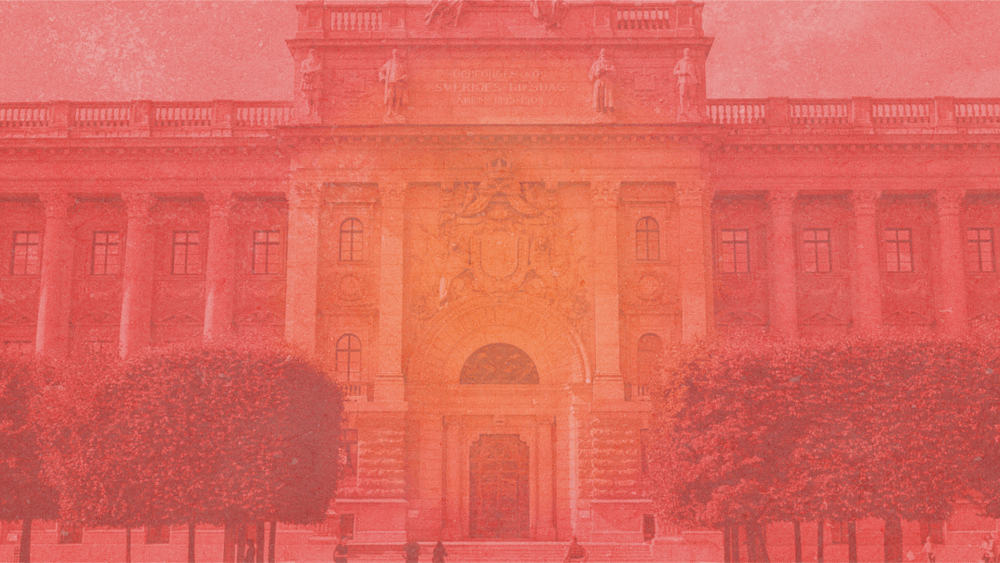It is the usual oligarchy of established politicians, rich families, think tanks and a media that works overtime to normalise society’s problems that have the dominant say in Sweden
Swedes are heading to the polls for the country’s general elections on September 11 and the run up to the vote is all too familiar. The media, think tanks and party leaders present yet another circus with the usual attractions: who is going to win; which political side will be victorious; which parties might gain possible seats in government; what the latest polls say and the usual predictable interviews with the leaders of the eight parliamentary parties.
The eight parliamentary parties and their support right now according to the latest opinion poll is as follows: Left (10%), Green (5%), Social Democrats (30%), Centre party (liberal) (8%), Liberals (5%), Christian Democrats (6%), Moderates (conservative) (16%) and Sweden Democrats (nationalists) (21%)
There is an even settlement between the left-wing bloc, which includes one of the liberal parties, and the new right-wing alliance with the Sweden Democrats. The fact that a liberal party supports Social Democrats, the Left and the Greens, is because they refuse to get involved with the Sweden Democrats.
Over the last five years, other bourgeois parties have slowly accepted the nationalists, even though they probably won’t be allowed to sit in government. That is despite the fact that they are currently the second largest party in Sweden after the Social Democrats – yes, you read that correctly!
Can any of these parties break the usual political deadlock? Definitely not!
It is the status quo that applies and the usual oligarchy of established politicians, rich families, think tanks and a media that, with few exceptions, works overtime to normalise society’s problems and to avoid any meaningful change. Criticism of the system doesn’t exist. The increase in mental illness is rationalised to an individual level, the situation in the EU and the influence of the banks are dead issues.
Sweden’s accession to NATO is hardly questioned. After an intense intimidation campaign in the media, the entire Swedish population was browbeaten within a month or so by the political establishment. Two hundred years of neutrality and international respect were lost.
But perhaps worst of all are the climate problems which, after the ravages of the summer in Europe, should generate panic. It is de-dramatised and instead converted into factual questions about whether or not nuclear power should exist, about green future investments, or green technology. All this is so that the wheels of society can continue to turn and the debate can be kept to the approved and elusive long-term view. The system is thus preserved and no politician needs to risk anything before the election.
Climate scientists debate, write articles and wonder what it is that politicians don’t understand; XR blocks streets in the middle of Stockholm, climate activists storm the stage of Sweden’s most popular entertainment programme live on television. Personally, I have been centrally involved in the newly–formed movement Climate Alliance consisting of former left-wing party leader and Swedish political icon Gudrun Schyman, religious representatives, climate activists, defected Green party members and people with an environmental interest from all sorts of organisations. An alliance where I have been able to represent DiEM25 in person. A movement with a single issue, to create a climate crisis mindset, a non-ideological alliance, which aims to put activists in Parliament, characterised by non-careerism: complete disinterest in political careers and pragmatic settlements in the corridors of Parliament.
The Climate Alliance is a political anomaly, a mutation in the Swedish political landscape that the other parties obviously try to avoid with classic gatekeeping but which is guaranteed to have reason to return and grow as more dried up rivers, record temperatures, water shortages and climate refugees await us in the future.
Most Swedish parties are part of the basic neoliberal overarching ideology that seeks a continued view of man as primarily an economic, materialistic consuming component of society. Nothing must disturb this in their eyes. Nor does the Swedish left, which certainly fights for justice in several ways, want to disturb the order. As soon as measures to slow fossil fuel emissions come up, conceivably threatening the industry, they step into the overarching ideology and defend the status quo just as they are critical of calls to stop traveling for the sake of the climate. They believe that people have the right to relax and go on holiday and drive as they please. The climate comes second or third. The other parties stand even further away from the climate problem. The electoral debate is characterised instead by how to deal with violent gang settlements, petrol prices, electricity prices and integration issues.
The Greens like to talk climate but do not have the trust of voters or those with a green ideological profile. They have too many other issues to consider and political pragmatism that erodes their ability to pursue green and climate radical politics. Years of climate problems have not given them any more support which is an unlikely failure. Instead, they have teetered on the brink of being able to remain in parliament.
We truly have an international task, I believe, that what I mention here is largely recognisable regardless of where we live in Europe. The elections in Sweden will be, as usual; an evening in front of the television and a politically correct national championship in politics with tacos and snacks: an existential sleeping pill and continued tribute to our techno-feudal culture.
The problem is not that we are walking on thin ice that will crack at any moment, the problem is that the longer time goes on the worse the consequences will be.
Mats Sederholm
Coordinator Stockholm Local Collective
Member of DiEM25 Press Team
Writer and active for Klimatalliansen
Email: mats@sederholm.nu
Do you want to be informed of DiEM25's actions? Sign up here















